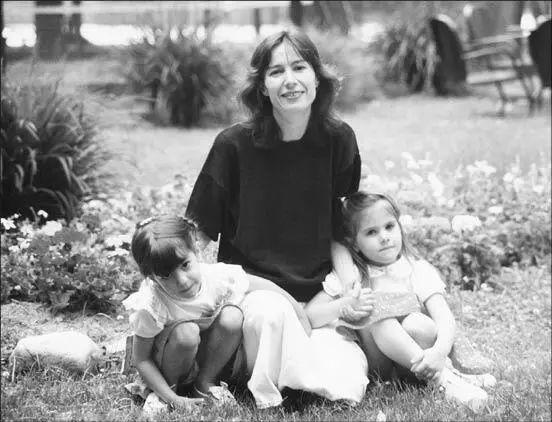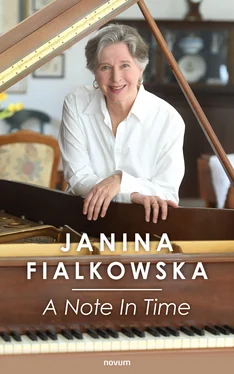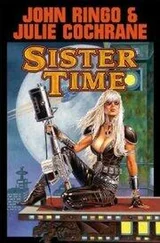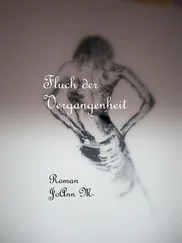There was also the Christmas tree episode. We had bought a little tree for our apartment and decorated it simply but prettily. When Epiphany came around, I took down the decorations and started to remove the tree. Dana begged for me to leave it a little while longer as she loved it so much. By Easter, when all the needles had fallen off and only dry sticks remained, I finally threw it in the garbage while Dana was out one day, only to be accused of heartlessness and given great big reproachful looks upon her return. Mind you, she was laughing not only at me but at herself all along.
It was hard for me to refuse Dana anything. For one thing she was so disarmingly funny, and for another it was wonderful to have such a devoted friend. She honestly believed that I could achieve anything and treated every career triumph I had as her own. This was a woman who as a child had been a prodigious talent, yet she felt absolutely no jealousy towards me. I was at the start of my career and extremely insecure about it all; Dana, although frail and fragile, provided me with huge strength and support.
And then one day she went to apply for a job teaching French at a language school in midtown New York. Fearful that she wouldn’t be hired because of her American-sounding name, she introduced herself using her middle name Patricia and invented a whole French background with a family living in Creteil outside Paris. For good measure she also lopped a few years off of her age. Her employer, François, was a nice young man with a handsome face and within a day or two they were “in love.” The romance lasted for nearly a year before Dana found out that François’ name was actually Saïd and that he was a Moslem from Morocco, and he found out that she was actually a Jewish girl from Buffalo, NY. But love can be a great builder of bridges, and for a while it almost seemed as though this could work. It didn’t – there was a miscarriage, then some nasty scenes, and suddenly illness reared its ugly head again and Dana was diagnosed with thyroid cancer.
She recuperated for several weeks up at my parents’ home and seemed to bounce back remarkably quickly, although she never could talk much above a whisper due to the damage to her vocal cords.
Back in New York she started up with François again only to come back to me soon after, distraught and in tears. For the first and only time in my life, I got quite furious with her as I heard her sobbing and being sick in the bathroom, having watched her not being able to eat for days. I stormed in and in an exasperated, angry voice told her that I was fed up with her – constantly getting involved with scum, breaking her heart and then coming back to me expecting me to pick up the pieces. To my total discomfiture Dana started laughing and laughing. She said that she had never seen me angry before and that I looked hilarious.
Shortly afterwards she upped and left for Paris where she had once been so happy. There she met a piano technician named Jean-Pierre, who had a certain Gallic charm and seemed harmless enough at first. She married him, had two delightful little girls and moved to Queens in New York, where Jean-Pierre got a job taking care of the pianos at Juilliard. But the marriage was doomed. She became ill again with breast cancer and a sick wife with two babies was simply too much for the weak and irresponsible Jean-Pierre. Their relationship disintegrated and Dana took the girls and returned to France where, never complaining, she had a dreadful winter. Jean-Pierre didn’t send any child support and, unbeknownst to all of her friends, she could barely afford to feed her children or heat her apartment. I remember sending her cheques occasionally, but they were supposed to be for toys for the girls or an extra nice article of clothing for her. I never suspected in what dire straits she was living because her letters were always so upbeat and full of funny anecdotes. I admired her courage and stoicism, but sometimes it was misplaced and illogical. If only I could have helped; if only she had asked for my help.
Then, in February 1991, Danny got a call from France; friends of Dana’s had taken in the two little girls and Dana herself was in hospital. She had been working as an accompanist in a small music school located far from her home, and it had meant walking several kilometres across town every day with her girls to get there, as she could not afford public transport or a baby-sitter. Her body had finally given out after so many years of disease and strain; she just collapsed. Danny and his partner Lou immediately flew over to France, collected Dana and the girls, and brought them home to New York. The night they returned, they celebrated Jessica’s (her eldest daughter) fifth birthday, and the next day they took Dana to the emergency ward of the Memorial Sloan Kettering Cancer Center. I saw her there twice that week, in a room surrounded by photos of Jessica and Nathalie, the children whom she considered the greatest and most valuable achievement of her life. With these two beautiful little girls, Dana, despite all the horrors and suffering of her last years, found her ultimate happiness – the family and the love she had craved so desperately all her short life. While I was there, they were aspirating the liquid that had built up in her lungs – an excruciating procedure, but she showed amazing courage. And then a young resident doctor came in and gently told her that they were going to have to start massive chemotherapy as the cancer had spread extensively over her emaciated body. With her frail thin little voice, she begged him to do whatever he could: “I have to live, you understand, I have to live for them,” and she gestured towards a photo of her children. Danny and Lou lovingly and devotedly watched over her and cared for the girls – shortly before the end they brought the girls to the lobby downstairs, arranging a little picnic there with their mother. I said good-bye to my best friend and told her that I’d see her again in two weeks’ time. With a smile, she bravely said that she hoped she’d be out of hospital by then. I had to leave for Milano, where Jeff Swann and I were to play the Brahms “Liebeslieder-Waltzes” with the La Scala Choir. Two days later, Biddy called me at my hotel with the news that Dana had died; she was forty years old, and she left behind two little girls of five and four years old and literally hundreds of grieving friends.
As I write this, I cannot see the page for tears. So many years later, I still miss her: that indomitable spirit, that courage, that extraordinary humour. And, above all, I miss our rare and priceless friendship.

Chapter 3
The Sounds and the Scents (“Les sons et les parfums”) by Claude Debussy
Returning to my own story, Anne-Marie Mangeot continued to have a great influence on Biddy, and it was on her advice that, the year I turned fifteen, I was enrolled in a summer course given by Yvonne Lefébure in Saint-Germain-en-Laye near Paris. Madame Lefébure was one of the most sought-after teachers in a nation that prides itself on its long and illustrious relationship with the piano.
The master classes took place in the charming eighteenth-century Pavillon de Noailles, owned by a Monsieur Guy, who was a great admirer of Mme. Lefébure and who donated his jewel of a house (which he had just acquired, and which was still unfurnished) for the duration of the course. Some students slept in camp beds right in the house. Others commuted every day from Paris and a few of us, myself included, stayed in the pension next door, where the simple French bourgeois fare was delicious.
Mme. Lefébure would appear two or three times a week to give master classes. Between times, we would all practise like crazy and be coached by one of her four assistants. The one I was assigned to was a capable and knowledgeable younger woman, with clearly burning ambitions of her own and very little tolerance or patience with the lesser students. Her better students adored her, but the rest spent their time fearful and generally in floods of tears. To me she showed only her most encouraging and rather artificially sweet side, but I was smart enough to realise that she was probably just hedging her bets with an eye to a possible good future recruit for her own class.
Читать дальше













